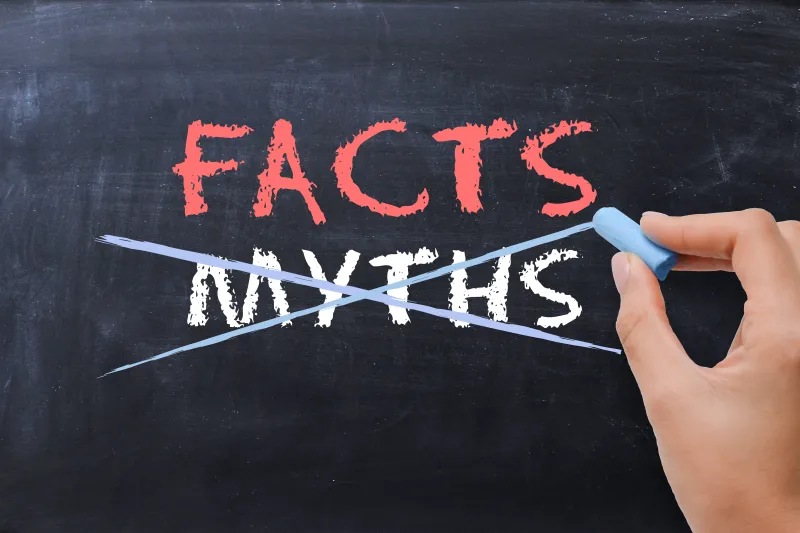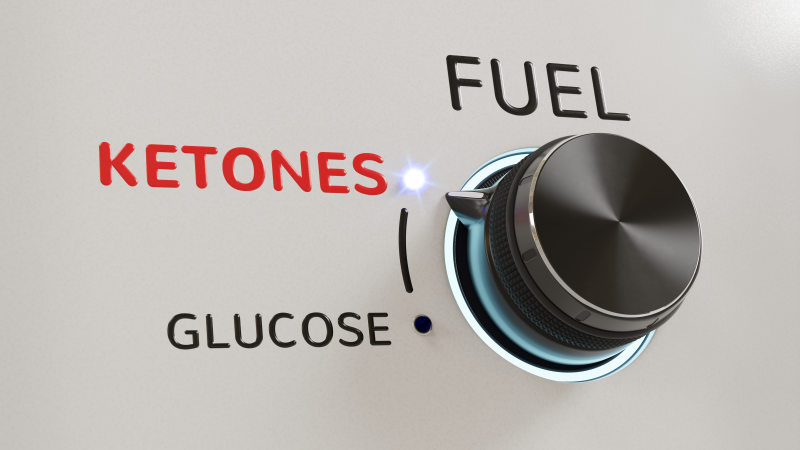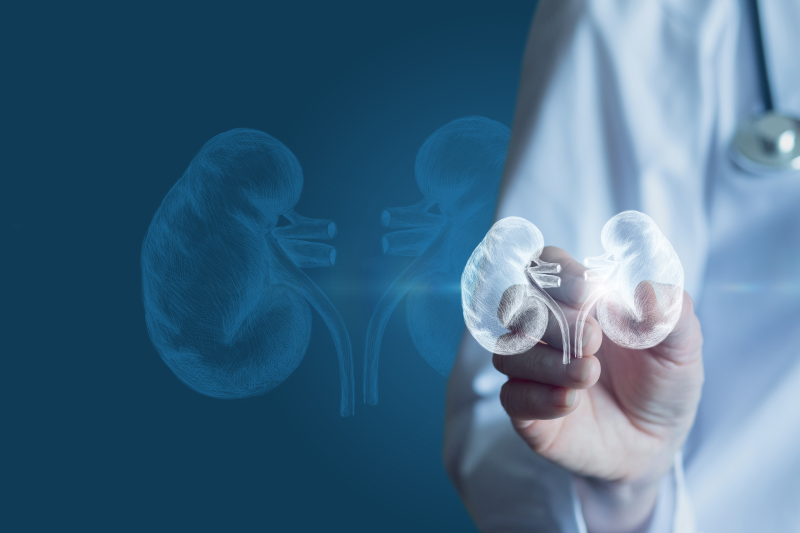At a glance
Concerns that keto may be harmful are often linked to low-carb diets that rely on highly processed or nutrient-poor foods. In contrast, a well-planned and nutrient-rich ketogenic plan, such as Healthy Keto®, supports weight management, metabolic balance, and overall wellness. Understanding the principles of achieving healthy ketosis helps separate facts from fiction.
A few people share alarming stories online, claiming, “Keto ruined my health!”
However, on closer look, many of these individuals have been binge-eating processed and high-fat foods without paying attention to the quality and nutritional value of their diet.
Discover the truth about common keto myths and learn how to approach a nutrient-dense, low-carb ketogenic diet that supports your health goals without causing harm.
What is keto?
The keto diet, short for ketogenic diet, is a meal plan that restricts carbohydrate intake to no more than 50 grams daily while obtaining the majority of daily calories from fat.
Limiting carbohydrates shifts the body into ketosis, a metabolic state during which the liver utilizes stored body fat and dietary fat to generate energy instead of relying on glucose as a fuel source.
As the liver breaks down fats, it produces a significant amount of ketones. These natural acids serve as highly efficient alternative fuel sources, powering the brain, muscles, and other tissues when glucose is limited.
This high-fat diet was originally developed to manage and treat epilepsy and seizures but has since become a popular approach for weight loss, metabolic health, and overall wellness.
Watch the video below to learn why it’s crucial to follow a nutrient-dense, low-carb diet.
How does keto work?
Keto has helped millions of people worldwide lose weight, enhance cognitive functions, promote overall well-being, and reduce the risk of chronic health conditions, including heart disease and diabetes.
Its impressive health benefits are primarily related to the profound metabolic changes in response to restricting carbohydrates, which promotes steady blood sugar and insulin levels.
Dietary carbohydrate intake causes frequent blood sugar and insulin spikes, which can overwhelm the body’s ability to manage blood sugar effectively and regulate insulin.
In contrast, a low-carb diet can help prevent, manage, and even reverse insulin resistance, a serious metabolic imbalance characterized by cellular unresponsiveness to insulin signaling.
“Insulin is a critical hormone that regulates fat storage, energy-making processes, blood sugar control, and hormonal balance,” says Dr. Berg. “This explains why insulin resistance has such detrimental effects on many critical physiological functions and overall health.”
Research published in StatPearls summarizes the health issues associated with insulin resistance:1
- Obesity
- Metabolic syndrome
- Prediabetes
- Diabetes
- Non-alcoholic fatty liver disease (NAFLD)
- Microvascular disease
- Heart disease
- Hypertension
- Hyperlipidemia
- Polycystic ovary syndrome (PCOS)
In addition, insulin resistance has been linked to poor central nervous system functions and an increased risk of Alzheimer’s disease and dementia.
The link between a low-carb diet and stable insulin levels explains why keto is so effective at supporting weight loss, enhancing cognitive functions, and improving energy levels while reducing the risk of various chronic diseases.
A high-fat diet can also help strengthen immune functions and lower inflammation, making keto a potentially beneficial strategy for individuals with autoimmune disorders or health issues linked to chronic inflammation.
This has been confirmed by a study published in Frontiers in Medicine, reporting that ketones have potent anti-inflammatory properties and directly stimulate immune cell activity, thereby supporting the body’s defenses against infections and disease.2

Can keto ruin your health?
A well-planned ketogenic diet won’t harm your health and isn’t associated with an increased disease risk.
Research published in Epilepsia investigated the health implications of the ketogenic diet in individuals who have been following a therapeutic high-fat diet to control epilepsy since childhood.3
The authors conclude that there isn’t any evidence that long-term adherence to a strict ketogenic diet causes adverse health effects.
However, as with any diet, it’s crucial to ensure the body’s energy and nutrient needs are met to minimize the risk of nutritional deficiencies and related health problems.
Unfortunately, many keto dieters only focus on avoiding certain food groups, such as whole grains and fruits, without adequately replacing them with nutrient-dense low-carb alternatives.
In addition, some individuals following keto rely on processed foods, ready-made meals, and snacks specifically marketed for low-carb diets. While these products may seem convenient, they typically contain unhealthy seed oils, additives, and preservatives, undermining the diet’s health benefits.
If you recently started a high-fat diet and experience lethargy, headaches, muscle cramps, and digestive issues, you most likely have developed keto flu. These symptoms don’t mean you have permanently ruined your health but are a temporary result of your body adjusting to ketosis and fat burning.
To alleviate keto flu symptoms, it’s essential to stay hydrated, replenish electrolytes, and ensure you’re consuming sufficient nutrients.

Addressing concerns and myths
A combination of not understanding the biochemical principles of ketosis and a fear of high-fat diets caused by outdated research that has long been refuted led to widespread misconceptions about the keto diet.
Let’s address five common keto myths and concerns.
1. A high-fat diet increases the risk of heart disease
Contrary to popular belief, a well-formulated high-fat ketogenic diet can actually improve heart health markers.
Evidence published in Nutrients confirms the cardioprotective effects of keto by summarizing, “The ketogenic diet has a beneficial effect on blood pressure and other CVD risk factors through, among other aspects, weight loss.”4
Furthermore, the authors report that the anti-inflammatory properties of ketones support blood vessel function and help counteract age-related changes in cardiovascular health, which helps reduce the risk of atherosclerosis, stroke, and heart attacks.

2. Ketosis is a sign of starvation
While starvation triggers fat-burning to provide the body with energy, nutritional ketosis achieved through a well-structured ketogenic diet is a controlled and healthy metabolic state.
Unlike starvation, which leads to muscle loss and severe nutrient deficiencies, ketosis occurs when the body adapts to using fat as its primary fuel source while still receiving adequate nutrition.
In addition, many believe that a ketogenic diet causes hunger and cravings.
However, keto can reduce appetite and cravings due to the appetite-regulating qualities of ketones and the satiating nature of dietary fats. This helps lose weight and makes keto a sustainable approach to promoting a healthy body.
3. Carbohydrates are essential for life
While carbohydrates are the body’s preferred energy source if available, they’re not essential for survival as the body can readily utilize ketones as an alternative fuel.
In addition, the liver can produce glucose through gluconeogenesis, a process that converts proteins and fats into glucose when necessary.
In addition, humans evolved primarily without staple carbohydrate sources such as grains and legumes. As a result, our digestive systems aren’t fully adapted to metabolize components of these foods, such as complex carbohydrates, lectins, and phytates.
This explains why a high-carb diet often triggers gut issues such as bloating, gas, and abdominal pain, which can typically be managed by restricting carbohydrate intake.

4. Keto damages kidney health
The myth that keto can damage the kidneys stems from confusing keto with a high-protein diet, which can strain kidney function due to the increased workload required to metabolize excess protein.
Keto involves moderate protein intake, typically aiming to consume around 20 percent of daily calorie needs in the form of protein, which won’t overload kidney function.
In fact, a low-carb diet can aid in losing weight and significantly improve metabolic health, both of which support healthy kidneys.
5. A low-carb diet is detrimental to bone health
A study published in Frontiers in Endocrinology reports no evidence that a ketogenic diet negatively impacts bone density or increases the risk of osteoporosis in later life.5
In addition, it’s noteworthy that obesity, insulin resistance, and diabetes are known risk factors for osteoporosis, which suggests that the metabolic benefits of the ketogenic diet may actually support better bone health.

Tips for healthy ketosis
Achieving healthy ketosis requires more than simply limiting carbohydrates.
To promote overall health while achieving your weight and wellness goals, it’s critical to follow a nutrient-dense, high-fat diet such as Healthy Keto®.
Healthy Keto focuses on nutritious, high-quality foods, including non-GMO organic vegetables, grass-fed beef, full-fat organic dairy and eggs, and wild-caught fish. In addition, Healthy Keto incorporates keto fats from nutritious plant foods such as avocados, nuts, seeds, and olive oil.
This dietary pattern not only promotes ketosis and fat-burning but also ensures the body receives essential vitamins, minerals, antioxidants, and dietary fiber.
By avoiding ultra-processed foods and emphasizing minimally processed options, Healthy Keto helps mitigate the risk of nutrient deficiencies and related health issues.
Additionally, this well-structured keto approach promotes satiety, making it easier to adhere to your goals without experiencing intense cravings or hunger.
For those new to the ketogenic lifestyle, it’s recommended to seek guidance from a registered dietitian specializing in nutrition education. This can help tailor your diet to meet individual needs and prevent potential deficiencies.
Key takeaways
- A well-planned ketogenic diet isn’t associated with long-term health problems if the body’s nutrient needs are met.
- Poorly planned keto diets that limit carbs without considering food quality can lead to nutrient deficiencies and related health issues.
- Healthy Keto emphasizes nutritious whole foods to promote ketosis while supporting metabolic balance, a healthy body weight, and optimal nutrition.
- Maintaining a nutrient-focused low-carb diet approach helps minimize keto flu symptoms and supports overall wellness.
FAQ
1. Can keto cause health problems?
Keto can cause health problems if not properly planned, leading to nutritional deficiencies and related health issues. However, a well-structured ketogenic diet such as Healthy Keto® that emphasizes nutrient-dense foods supports overall health while minimizing the risk of deficiencies.
2. Can you do keto long term?
Yes, you can do keto long term, provided you focus on a well-balanced and nutrient-dense approach to achieve healthy ketosis by incorporating nutrient-rich, high-quality foods, including non-GMO organic vegetables, grass-fed beef, full-fat organic dairy and eggs, and wild-caught fish.
3. Does keto damage your metabolism?
No, keto won’t slow down your metabolism. In fact, keto can enhance metabolic flexibility by teaching your body to efficiently utilize fat as a primary energy source.
However, it’s crucial to maintain a well-structured ketogenic diet that provides adequate nutrients and avoids extreme caloric restriction, as these factors can negatively impact metabolic health.
4. Is keto bad for your kidneys?
No, keto isn’t bad for your kidneys. Diet-related kidney issues are typically linked to a high-protein diet, which can overwhelm the kidney’s capacity to process by-products of protein metabolism.
In addition, rapid weight loss due to a significant caloric deficit can increase the risk of kidney stones, highlighting the importance of following a well-planned ketogenic diet to meet the body’s energy and nutrient requirements.
5. How can I do keto safely?
To do keto safely, focus on a Healthy Keto diet that includes nutrient-dense foods such as non-starchy vegetables, healthy fats, and high-quality proteins.
Additionally, stay hydrated, monitor your body’s response, and consider consulting a healthcare professional or registered dietitian to ensure you’re meeting your nutritional needs.
6. How do I know if keto ruined my health?
If you have developed health issues in response to following a ketogenic diet, it’s critical to review the nutritional quality of your food choices.
Just like any other diet that lacks adequate nutrients, a poorly planned ketogenic diet can lead to deficiencies and health problems, including fatigue, digestive issues, and weakened immune defenses.
Sources
- https://www.ncbi.nlm.nih.gov/books/NBK507839/ ?
- https://www.frontiersin.org/journals/medicine/articles/10.3389/fmed.2022.923502/full ?
- https://onlinelibrary.wiley.com/doi/full/10.1111/j.1528-1167.2009.02488.x ?
- https://pmc.ncbi.nlm.nih.gov/articles/PMC10421332/ ?
- https://pmc.ncbi.nlm.nih.gov/articles/PMC9932495/ ?












